The MEALS4NCDs Project, presently being implemented by the University of Ghana, in collaboration with the University of Health and Allied Sciences (UHAS), the Ghana Health Service (GHS), the African Population and Health Research Center (APHRC), Kenya, National Research Institute for Sustainable Development (IRD), France, University of Amsterdam, The Netherlands, and the Scientific Institute of Public Health (Sciensano), Belgium, has successfully hosted the First Africa Food Environment Research Network Meeting (#FERN2020).
The three-day Virtual Meeting had the theme “Connecting Food Environment Researchers across Africa”. The FERN is a capacity-building aspect of the MEALS4NCDs Project, which seeks to measure and support public sector actions that create healthy food marketing and food provisioning environments for children and adolescents in Ghana. It is anticipated that such actions will contribute to preventing obesity and other diet-related non-communicable diseases (NCDs).
Contributing to the event were 26 distinguished speakers from Africa, Asia, Australia, Europe, and North America. Participants were informed in detail about some existing research methods/approaches. Speakers and participants shared experiences, challenges, and opportunities for improving food environment research, policy, and practice – including advocacy for prevention NCDs in Africa.
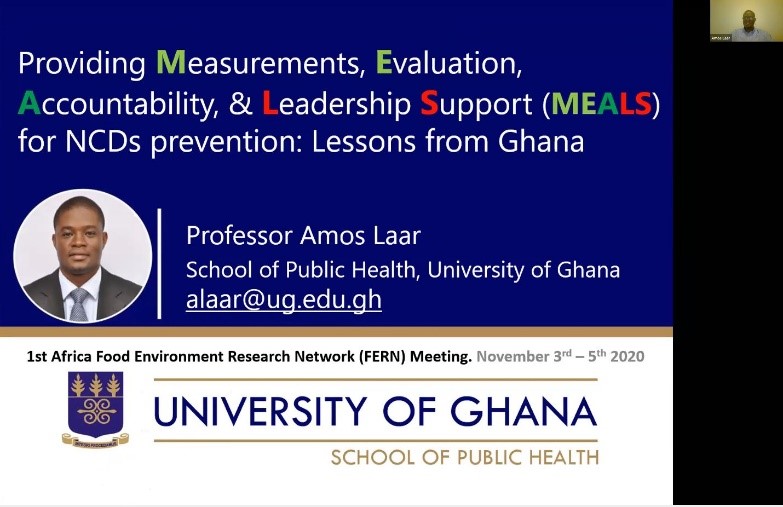
In his welcome address, Professor Amos Laar, Principal Investigator/Project Lead of the MEALS4NCDs Project shared with participants an overview of the MEALS4NCDs Project and progress made by the Project team towards the fight of obesity and diet-related NCDs in Ghana.
He noted that, given the established connection between unhealthy food environments and obesity/NCDs, Africa needs policies designed to create supportive food environments for healthy food choices for everyone. Generation of local evidence can provide insights into which policies may be more effective in combating diet-related NCDs in Africa. Professor indicated that the MEALS4NCDs, which is providing “Measurement, Evaluation, Accountability and Leadership Support for obesity/NCDs prevention in Africa” pays heed.
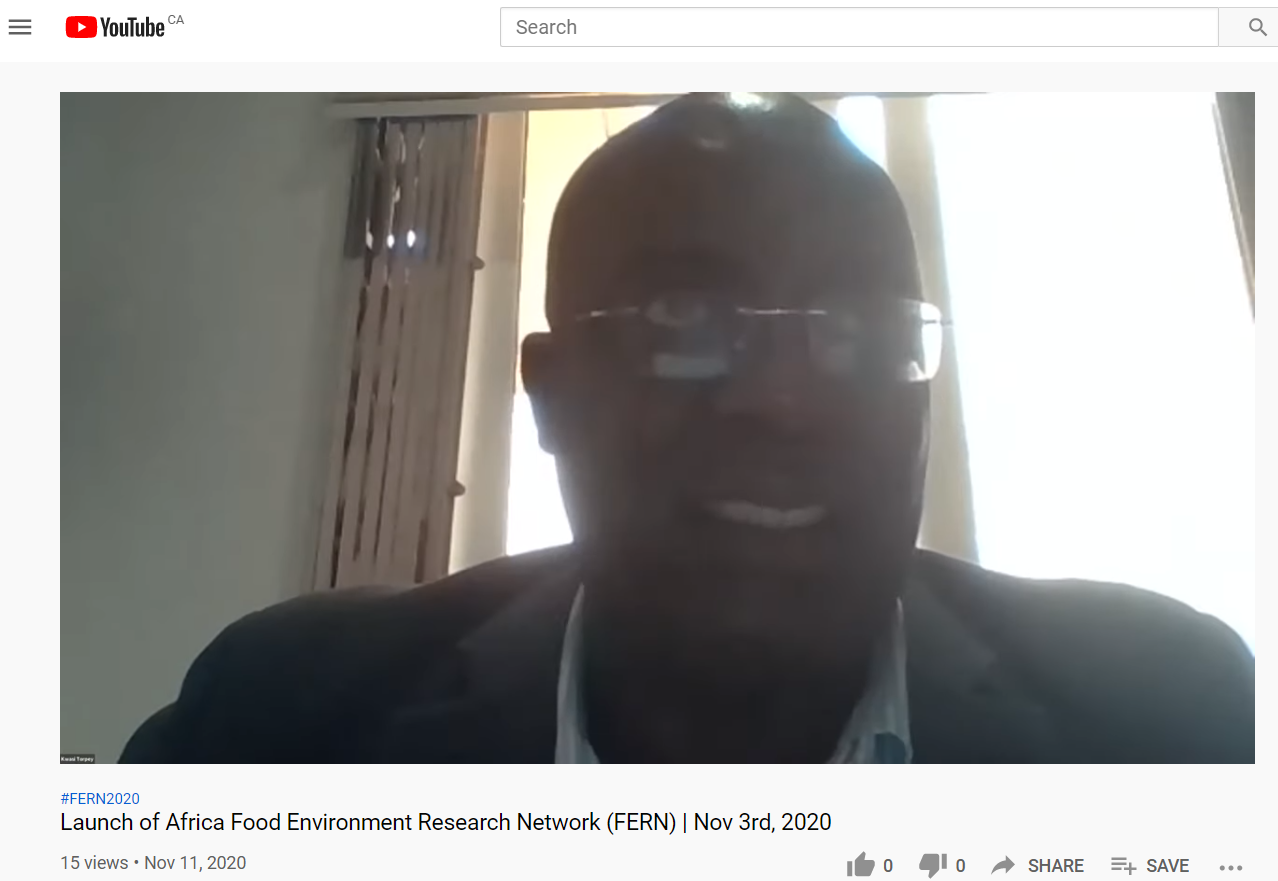
Launching the FERN Initiative, Professor Kwasi Torpey of the University of Ghana, lamented that over the past couple of decades, “high level continental nutrition and health policies have all focused on ridding Africa of hunger and food insecurity, with little attention paid to overnutrition”. He urged researchers to ensure they generate the evidence needed to fight this war in Africa. Drawing inspiration from an admonition by Dr Tedros Adhanom Ghebreyesus, Director General of the World Health Organisation (WHO) Professor Torpey reiterated that “If we are to win the war against premature deaths caused by obesity/NCDs, we must also win the battles in our kitchens, shops, supermarkets, restaurants, schools …. We must make it easier for people to make healthy choices, and harder to make unhealthy choices”, and the academics have a special role to play in this.
Following the launch, the distinguished subject experts engaged the FERN delegates from November 3rd to November 5th 2020. To those who missed the event, all the speaker presentations and video recordings have been uploaded on the MEALS4NCDS website, and can be accessed at no cost via this link: https://www.meals4ncds.org/fern-2020-presentations/
Integrated into the meeting were two capacity building sessions aimed at stimulating and strengthening participants’ capacity to adopt and adapt two of the International Network for Food and Obesity / Non-communicable Diseases (NCDs) Research, Monitoring and Action Support (INFORMAS) protocols – Healthy Food Environment Policy Index (Food-EPI) Module, and the Food Prices Module
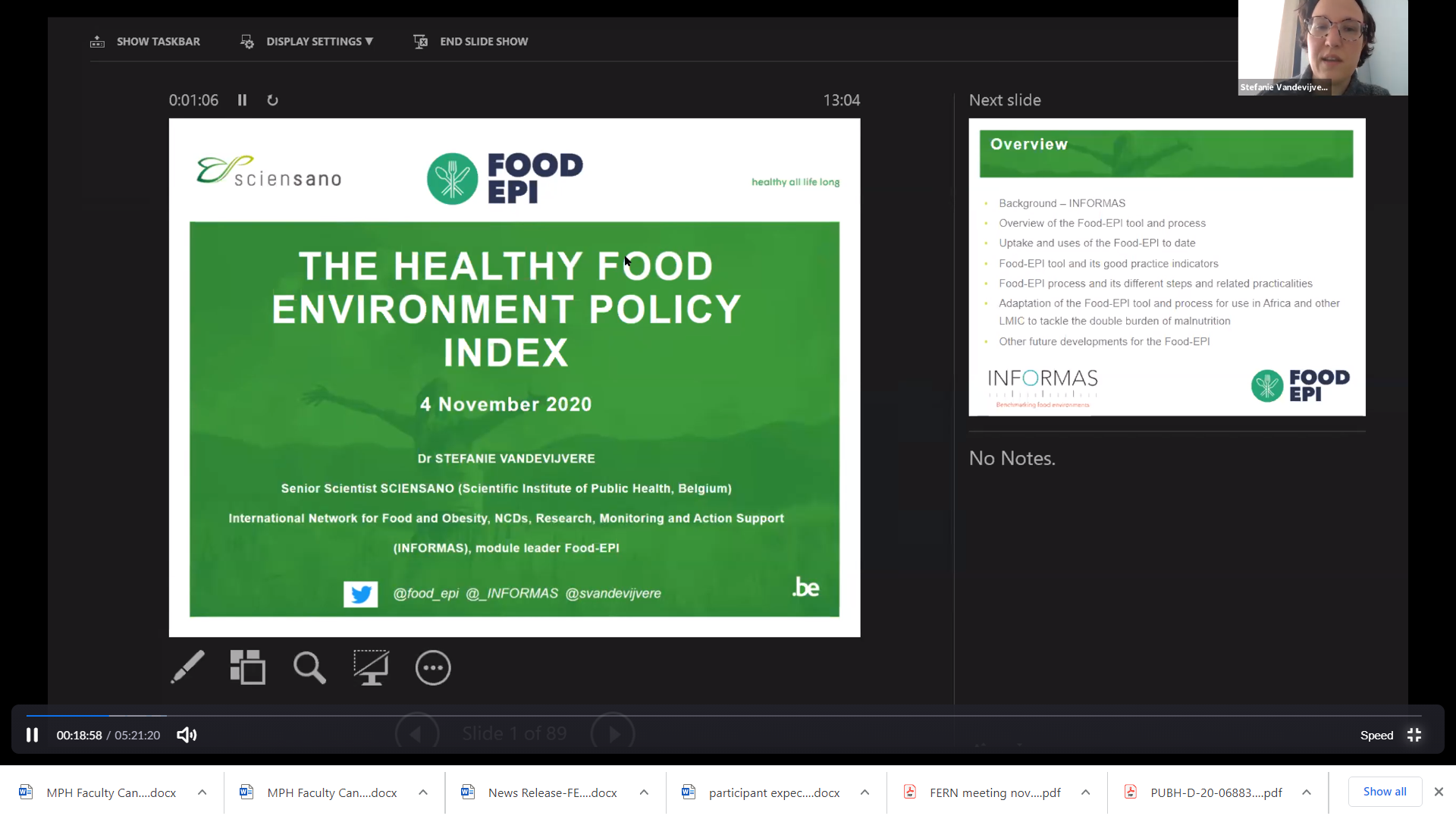
Dr. Stefanie Vandevijvere, INFORMAS Food EPI Module Leader and MEALS4NCDs project Co-Investigator started the capacity building sessions with a presentation on introduction of the INFORMAS Healthy Food Environment Policy Index (Food-EPI) module. The Food –EPI Module aims at measuring the extent of implementation of healthy food environment policies by governments compared to international best practice. She emphasized the importance of customising the INFORMAS Food-EPI approaches to the local context. Details on the INFORMAS Food-EPI are available here https://www.informas.org/modules/public-sector/. Her presentation (PDF/Video) of her session is available on the MEALS4NDs Project website at https://www.meals4ncds.org/fern-2020-presentations/
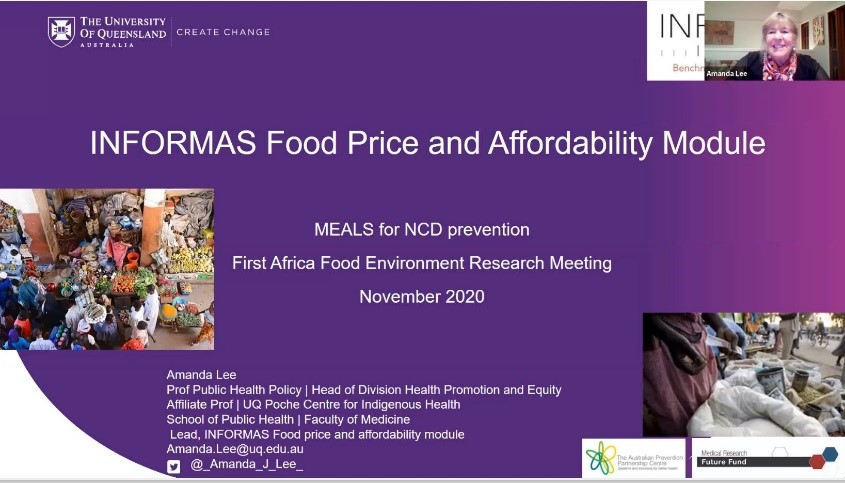
Prof. Amanda Lee, INFORMAS Food Price Module Leader and a Professor Of Public Health Policy at the University of Queensland delivered the session on adapting the INFORMAS Food Price and Affordability during the second capacity building session of the meeting. She mentioned that the purpose of this Module is to monitor the relative price and affordability of ‘less healthy’ vs ‘healthy’ foods to provide robust data and benchmarks to inform economic and fiscal policy responses. Participants were taken through the different approaches of implementing the INFORMAS’ Food Price module -Minimal approach, expanded approach and the optimal approach. Details on the INFORMAS Food Price are available here https://www.informas.org/modules/food-prices/. Her presentation (PDF/Video) of her session is available on the MEALS4NDs Project website at https://www.meals4ncds.org/fern-2020-presentations/
Having received the needed training, participants were encouraged to implement or reach out to the INFORMAS Team or the MEALS4NCDs Team if they wish to implement some of Modules (particularly the Food EPI Module of INFORMAS) in their respective countries.
To round off the meeting, Professor Francis Zotor, of the University of Health & Allied Sciences and a MEALS4NCDs project Co-Investigator facilitated an Open Forum where participants deliberated on what are or should be the food environment research priorities in Africa. Some of the priorities identified included “exploring and evaluating existing interventions to promote healthy diets in ways that goes beyond ‘what works’ but also identifies ‘for whom it works and under what context.
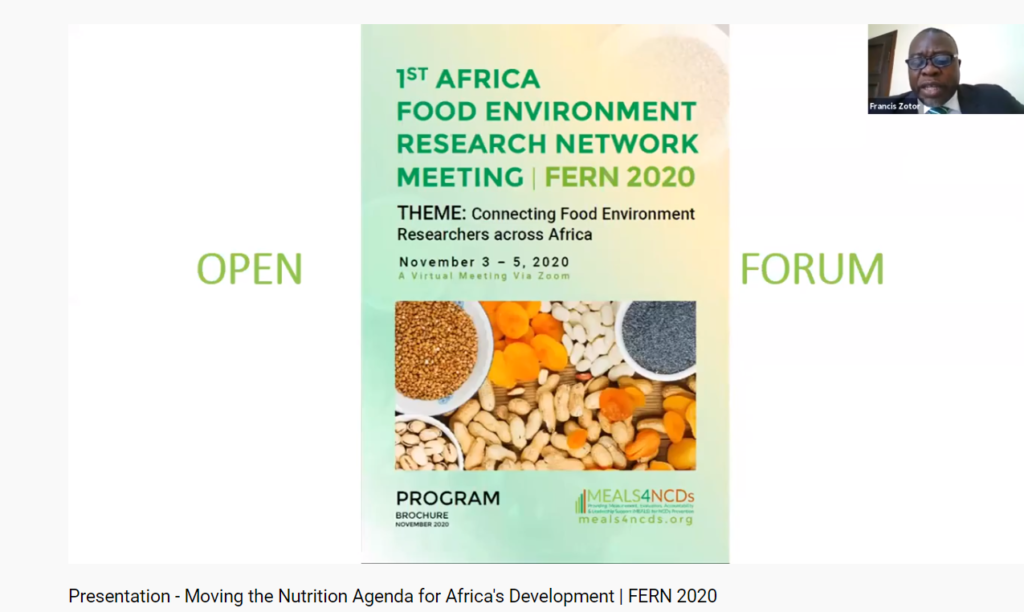
In delivering the closing remarks, Professor Amos Laar expressed his appreciation to all those who contributing to FERN – the MEALS4NCDs Core Team, and Advisory Board members, the students and early career researchers supporting the Project, the distinguished speakers, and capacity building Mentors, and who interacted with all or most of the over 600 registrants from 56 countries – via Zoom and via the Live-Stream Channels on Social Media. He noted that the closing of this meeting is not an end, but a beginning for what they hope will be a very fruitful, impactful, and sustainable collaboration.

Funding acknowledgements
The FERN Meeting/the MEALS4NCDs Project is funded by The International Development Research Centre (IDRC) Food, Environment, and Health Program—IDRC, Canada

